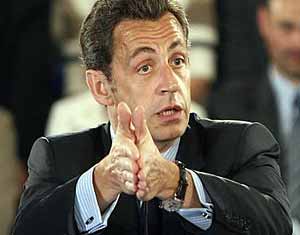19.06.2008
June 15, 2008 (the date of publication in Russian)
Ruslan Kostyuk
THE ITCH OF CONSTITUTIONAL REFORMS
An innovative Sarkozy denies himself the third term
 During the last month, the political and social situation in France was unusually tense for the onset of the summer season. Trade union manifestations followed one another like in a kaleidoscope. Teachers went out to express disappointment with the planned reform suggesting slashes of jobs in secondary schools, colleges and universities; for the second time during the month, teachers spoke out their disaccord with the plans of Francois Fillon's cabinet to increase the minimal pensionable seniority. They were followed by fishermen who paralyzed several major ports thus expressing dissatisfaction with the increase of fuel prices. By the way, during the recent "fishermen's riot" in Brussels, when West European sailors smashed windows in EU offices, the pitch was set by protesters from France.
During the last month, the political and social situation in France was unusually tense for the onset of the summer season. Trade union manifestations followed one another like in a kaleidoscope. Teachers went out to express disappointment with the planned reform suggesting slashes of jobs in secondary schools, colleges and universities; for the second time during the month, teachers spoke out their disaccord with the plans of Francois Fillon's cabinet to increase the minimal pensionable seniority. They were followed by fishermen who paralyzed several major ports thus expressing dissatisfaction with the increase of fuel prices. By the way, during the recent "fishermen's riot" in Brussels, when West European sailors smashed windows in EU offices, the pitch was set by protesters from France.
A less detrimental but still very emotional confrontation was simultaneously taking place in the lower house of the National Assembly. President Nicolas Sarkozy had promised, already at his inauguration, to introduce a "comprehensive reform of the Constitution", making it "more flexible, innovative and liberal". It is noteworthy that even the most famous predecessors of Mr. Sarkozy used to demonstrate loyalty to the spirit and institutions of the Fifth Republic. Even socialist Mitterrand did not question the basic provisions of the constitution. During the 12-year tenure of Jacques Chirac, no serious constitutional changes had been introduce, except a few amendments necessary for ratification of EU agreements and for the transition from the 7-year to the 5-year term.
Unlike his predecessors, Sarkozy was true to his election catchword of "emancipation". He certainly does not mean emancipation from the Fifth Republic, as his party, Alliance for a Popular Movement, positions himself as a neo-Gaullist – but still, he and his associates find necessary to introduce a number of groundbreaking initiatives of constitutional reform.
Using its absolute majority in the lower house, the Alliance for a Popular Movement easily promoted a number of crucial amendments. They include the ban for election of the same person as President more than twice (not only sequentially), the procedure of approving ministerial candidatures by a special parliamentary commission, the possibility to launch referendums on the request of one fifth of MPs in case of collecting 10% signatures of voters (around 4mln of the population), and the legal consolidation of the "parity principle" (man/woman) in the professional sphere.
Undoubtedly, these amendments are making the French political system more democratic. Nevertheless, both leftists and rightists rejected Sarkozy's amendments. The socialists and communists oppose the reform not from the desire of transition to a parliamentary republic but because of the conviction that Sarkozy's amendments are not more than camouflage, enabling the rightist majority to disguise the authoritarian character of state institutions. In particular, the leftists demand legislative restriction of combining duties (most of French MPs simultaneously serve as mayors, federal and regional councilors). Even ministers de jure have a right to be employed as mayors. In addition, leftists insist on democratization of the Senate through introducing direct elections.
In order to eventually come into force, the amendments are to be passed by the joint session of the two houses. But in this case, the amendments have to attain support from at least three fifths of the MPs. Sarkozy's party will have to work hard to gain such a definite advantage – as the presidential initiatives don't elicit applause in the rightist camp as well.
Number of shows: 1123
 ENG
ENG 

 ENG
ENG 
